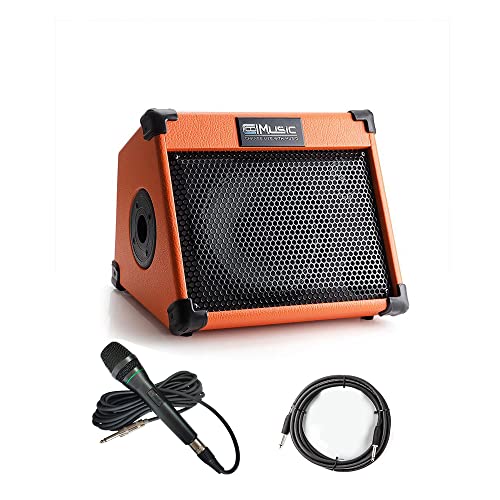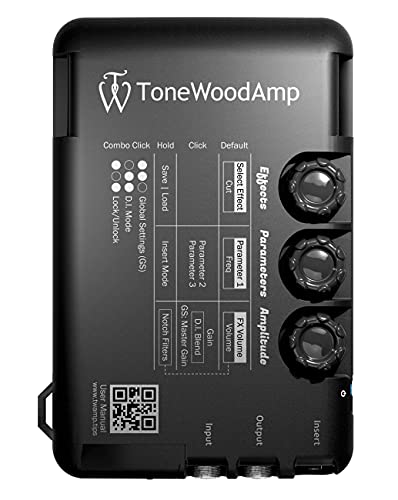TOP PICKS
Bestseller No. 1
Fender Acoustasonic Guitar Amp for Acoustic Guitar, 15 Watts, with 2-Year Warranty 6 Inch Speaker, Dual Front-Panel inputs, 11.5Hx11.19Wx7.13D Inches, Tan
- The Fender Acoustasonic Guitar Amplifier features 15 watts, 11.5Hx11.19Wx7.13D inches
- The Acoustasonic 15’s convenient dual front-panel inputs include a standard ¼ inch jack for an instrument and an XLR input for a microphone
- This unique amplifier is the only Fender guitar amp to feature a "whizzer" cone—a small supplementary speaker cone attached to the voice coil of the amps 6 inch speaker
- The portable and lightweight design allows for easy transport and its headphone output is a great solution for silent practice
- 2 Year Limited Warranty: Fender amplifiers are designed for players and built with unmatched quality, down to the last screw—Fender warrants this amplifier to be free from defects in materials and workmanship for two (2) years from original purchase
SaleBestseller No. 3 −6%

Acoustic Guitar Amplifier, 20 Watt Bluetooth Amp for Guitar Acoustic with Reverb Chorus Effect, 3 Band EQ(Including Microphone and Audio Cable)
- 【2 Channel】It is able to plug in 2 different instruments together, such as guitar, microphone, etc.
- 【3 Band EQ 】3 Band Balance(Bass,Mid,High) meet the needs of various music style and the built-in reverb effect ensures natural and echo-like sounds
- 【Bluetooth】BT means Bluetooth.Provide with options of wireless connection, phone input, CD/MP3 input, and USB plugin, it is able to fit in the different connection types, it is convenient and useful with its master control, headphone input and DI output
- 【20 Watt】8- inch woofer and 2-inch tweeter can deliver a big, full and natural sounding for acoustic guitar and microphone,20 Watt has enough power for your needs, able to fit in different situations like live, studio, solo performance and practice, giving you more freedom to control your sound to be heard over the other musicians without pushing your amp out of its optimal operating range
- Effects: Reverb & Chorus; 15*14*13 inches midsize and 16 lbs allow a less burden performance
Bestseller No. 4
Boss Acoustic Singer Live 60-Watt Bi-Amp Acoustic Combo with FX
- Professional acoustic amplifier with premium sound and features
- Harmony function automatically creates smooth and accurate vocal harmonies via real-time key/chord analysis of the guitar input
- Chorus effect on guitar channel, delay/echo effect on mic channel, and independent reverb on both channels
- Dedicated guitar channel with Acoustic Resonance to restore natural tone to stage guitars with piezo pickups
Bestseller No. 6

Acoustic Effects- No Amp Required! ToneWoodAmp SOLO Multi-Effect Processor for Acoustic-Electric Guitars (Right Handed)
- 【One Of A Kind Experience】The ToneWoodAmp works on virtually any acoustic guitar! Adds beautiful sounding organic guitar effects to your acoustic* and acoustic-electric guitar, NO AMP REQUIRED! Reverbs like Hall, Room, Plate, Delay, Leslie, Auto-Wah, and Chorus, all from the soundhole of your guitar! Works on YOUR guitar! No need to buy a whole new instrument! (*If your guitar isn’t acoustic-electric please search and get “ToneWoodAmp SOLO + Pickup Bundle for non-electric guitars”
- 【No Amp Required】 XXXX Get Reverbs like Hall, Room, Plate, Delay, Leslie, Auto-Wah, and Chorus, no amp required! All sounds come from the soundhole of your guitar organically. Buy one ToneWoodAmp and use it with any of your acoustic guitars! No need to buy a whole new instrument!
- 【Easily Attaches And Detaches】 Experience the Acoustic Guitar in a whole new way! Easily attaches to the back of your guitar using our unique magnetic X-brace, while protecting all points of contact to ensure no damage or permanent impact to your guitar. Uses patented vibration technology to create effects inside your guitar WITHOUT plugging into amps or pedals!
- 【Multi-Effect Processor】 Doubles as a Multi-Effect Processor! Connect to guitar amplifiers, PA Systems, and use on-stage or as a DI box! Powered by 3 AA-batteries, you will get many hours of playing time. Use Rechargeable batteries for better performance.
- 【Easy And Quick Install】 NO special tools or technicians required!Installs in just a few minutes Easily attaches to multiple guitars, Magnetically attaches and detaches.
Bestseller No. 7

Acoustic Guitar Amplifier, 30 Watt Bluetooth Speaker Rechargeable Portable Acoustic Guitar Amp with Reverb Chorus Effect,3 Inputs, Black
- 【30 Watt】: Portable acoustic guitar amplifier 1:1 restore the guitar tone, 30 Watts output and 6.5 inch speaker, providing you with professional and powerful guitar sound.
- 【2 Channel】: It is able to plug in 2 different instruments together, such as guitar, microphone, etc, and the microphone channel is embedded 2-band EQ(bass/treble) adjustment and reverb effect to achieve voice modification function.
- 【Bluetooth】: Compatible with most BT devices, such as smartphone, tablet, laptop and so on, you can play accompaniment music while do guitar practice or enjoy the fun of music listening.
- 【Rechargeable】: Built-in large capacity rechargeable battery, 3 hours charging time and 4-8 hours working time, no need of external power supply, just enjoy the music anytime anywhere.
- 【Portable】: With delicate wooden shell and compact size design, the guitar amplifier can be easily carried anywhere via the strap, which makes it quite suitable for travel use.
Bestseller No. 8
Acoustic/Electric Guitar Amplifier, 15 Watt Portable Bluetooth Amp for Guitar Acoustic/Electric with Reverb Effect, 2 Band EQ,Orange
- 【15-Watt】15-Watt Guitar Amplifier that provides explosive tone with super portable size.
- 【3 Inputs】Electric guitar input with distortion effect, acoustic guitar input with reverb, alao with AUX in, which will bring you a great sound feast
- 【Bluetooth】You can use your phone or I pad to play background music for your workout.
- 【Portable】: With delicate wooden shell and compact size design, the guitar amplifier can be easily carried anywhere via the strap, which makes it quite suitable for travel use.
- 【Rechargeable】It can run up to 5-8 hours depends on the volume you use after 5 hours charge. And it can work with a connection directly to the electricity.
Bestseller No. 9

Coolmusic BP40D Powered Acoustic Guitar Amplifier- Portable Bluetooth Speaker 80W W/Battery with Reverb Chorus Delay Effect, 6 Inputs,3 Band EQ, Blue
- 【6 Inputs】4 musical instrument inputs and 2 auxiliary inputs, which can fully satisfy a small band. It can connect 2 instruments (guitar, piano, keyboard, etc.), 2 microphones, two mobile phones or computers at the same time. Two independent EQ effects adjustment , Boost or attenuate the low-frequency, mid-frequency and high-frequency DB values.
- 【80 Watt】Double 6.5- inch woofer and Double 2-inch tweeter deliver clear, lifelike ,dynamic, powerful sound; A 80 watt continue power amplifier pumps up the volume.
- 【Bluetooth】: Compatible with most BT devices, such as smartphone, tablet, laptop and so on, you can play accompaniment music while do guitar practice or enjoy the fun of music listening.
- 【Rechargeable】It can run up to 6-8 hours depends on the volume you use after 5 hours charge. And it can work with a connection directly to the electricity.
- 【Condenser microphone switch】: The microphone interface is designed with 48V phantom power, compatible with condenser microphones and dynamic microphones.
BUYING GUIDE
Acoustic amplifiers are specifically designed to amplify the natural resonance and tone of acoustic instruments, primarily acoustic guitars. They offer the perfect balance between volume and clarity, preserving the nuances of the acoustic sound. Choosing the right acoustic amplifier can greatly enhance your performance, whether you’re playing at home, recording in a studio, or playing a gig. This guide will walk you through the main factors you should consider when purchasing an acoustic amplifier.
1. Power Rating: The power rating, measured in watts, determines how loud your amplifier can get. For small gigs or home use, an amp in the 15 to 50 watt range would suffice. For larger venues or band settings, consider higher wattage, such as 60 to 100 watts.
2. Channels: Look for an amplifier with at least two channels if you plan to sing and play guitar at the same time. One channel is for your instrument, and the other is for a microphone. Some amps also have a dedicated channel for a secondary instrument.
3. EQ Controls: Equalization controls allow you to shape the sound of your amplifier. At a minimum, your amp should offer basic controls for treble, mid, and bass frequencies. More advanced amps may also include controls for presence and resonance.
4. Effects: Many acoustic amps come with built-in effects like reverb and chorus, which can add depth and richness to your sound. If you use a lot of effects, consider an amp with a dedicated effects loop.
5. Connectivity: Look for amps with DI outputs if you plan to play larger venues. This allows you to connect your amp directly to the PA system. For home recording, an amp with a USB or headphone output could be beneficial.
6. Speaker Size: The size and number of speakers can impact the tone and projection of your amp. Larger speakers (10-12 inches) are great for bass response, while smaller speakers (6-8 inches) emphasize the mid and treble frequencies.
7. Portability: If you plan to move your amp often, consider its size and weight. Some acoustic amps are designed to be lightweight and compact for easy transportation.
8. Build Quality: The durability of the amp is crucial, especially if you’re going to be transporting it frequently. Look for an amplifier with a sturdy construction and good quality components.
Conclusion: Choosing the best acoustic amplifier comes down to your specific needs and preferences. By taking into account power, channels, EQ controls, effects, connectivity, speaker size, portability, and build quality, you can find an amp that not only enhances your sound but also fits your lifestyle. As always, remember to listen to the amp before you buy – ultimately, your ears should be the final judge. Happy playing!










